Report on Entrepreneurship: Venture Types, Impact, and Startups
VerifiedAdded on 2021/01/02
|23
|2575
|253
Report
AI Summary
This report provides an in-depth analysis of entrepreneurship and small business management. It begins by defining entrepreneurship and explores different types of entrepreneurial ventures, including micro, small, medium, and large ventures, and their relation to entrepreneurship typologies such as scalable and social ventures. The report then examines the similarities and differences between these ventures. A significant portion of the report is dedicated to interpreting and assessing data on how micro and small businesses impact the economy, both nationally and regionally, highlighting their contributions to GDP and job creation. Furthermore, it emphasizes the importance of small businesses and business start-ups to the growth of the social economy, including their role in reducing poverty and providing infrastructure. The report concludes by summarizing the key findings and emphasizing the importance of entrepreneurial traits and skills for business success.

Entrepreneurship
and Small Business
Management
and Small Business
Management
Paraphrase This Document
Need a fresh take? Get an instant paraphrase of this document with our AI Paraphraser
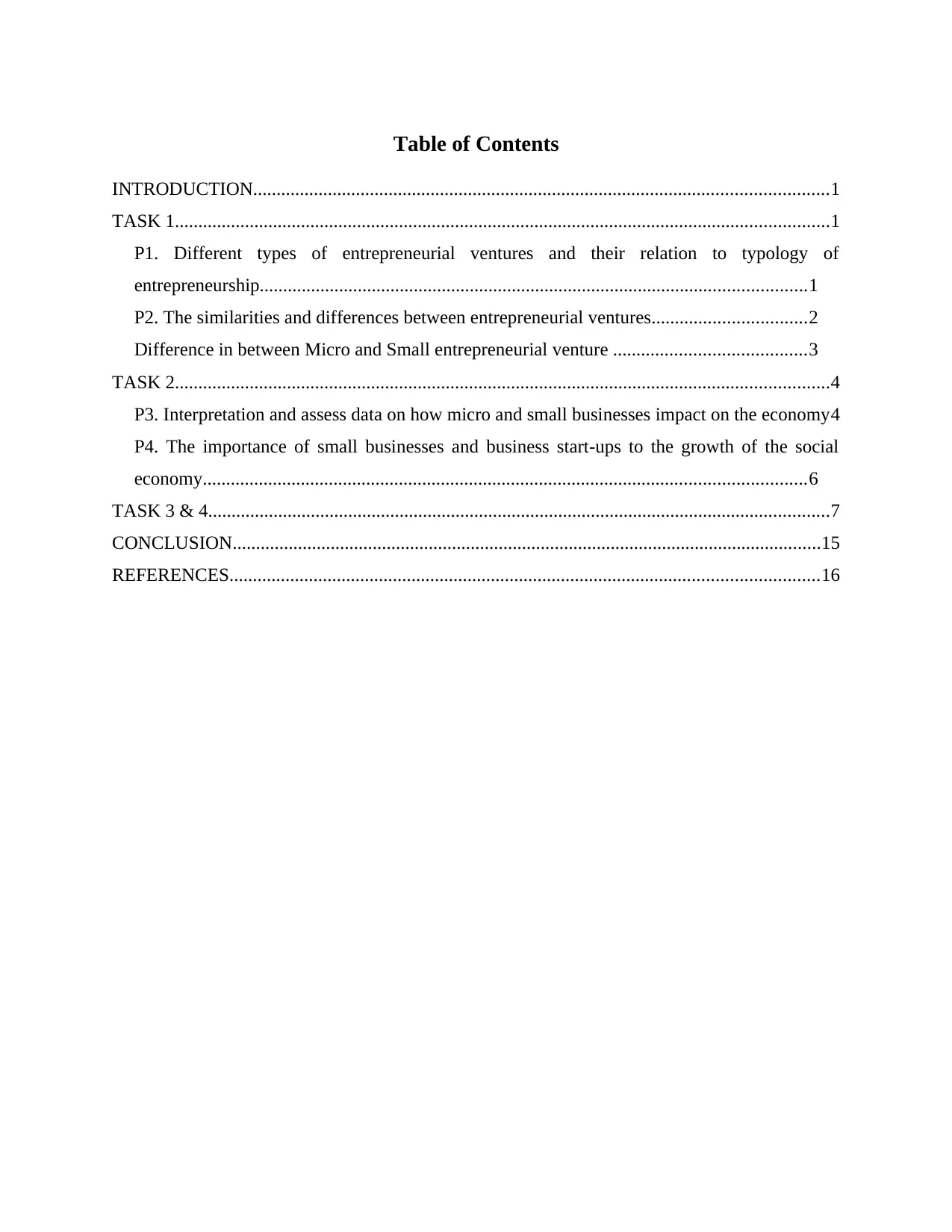
Table of Contents
INTRODUCTION...........................................................................................................................1
TASK 1............................................................................................................................................1
P1. Different types of entrepreneurial ventures and their relation to typology of
entrepreneurship.....................................................................................................................1
P2. The similarities and differences between entrepreneurial ventures.................................2
Difference in between Micro and Small entrepreneurial venture .........................................3
TASK 2............................................................................................................................................4
P3. Interpretation and assess data on how micro and small businesses impact on the economy4
P4. The importance of small businesses and business start-ups to the growth of the social
economy.................................................................................................................................6
TASK 3 & 4.....................................................................................................................................7
CONCLUSION..............................................................................................................................15
REFERENCES..............................................................................................................................16
INTRODUCTION...........................................................................................................................1
TASK 1............................................................................................................................................1
P1. Different types of entrepreneurial ventures and their relation to typology of
entrepreneurship.....................................................................................................................1
P2. The similarities and differences between entrepreneurial ventures.................................2
Difference in between Micro and Small entrepreneurial venture .........................................3
TASK 2............................................................................................................................................4
P3. Interpretation and assess data on how micro and small businesses impact on the economy4
P4. The importance of small businesses and business start-ups to the growth of the social
economy.................................................................................................................................6
TASK 3 & 4.....................................................................................................................................7
CONCLUSION..............................................................................................................................15
REFERENCES..............................................................................................................................16
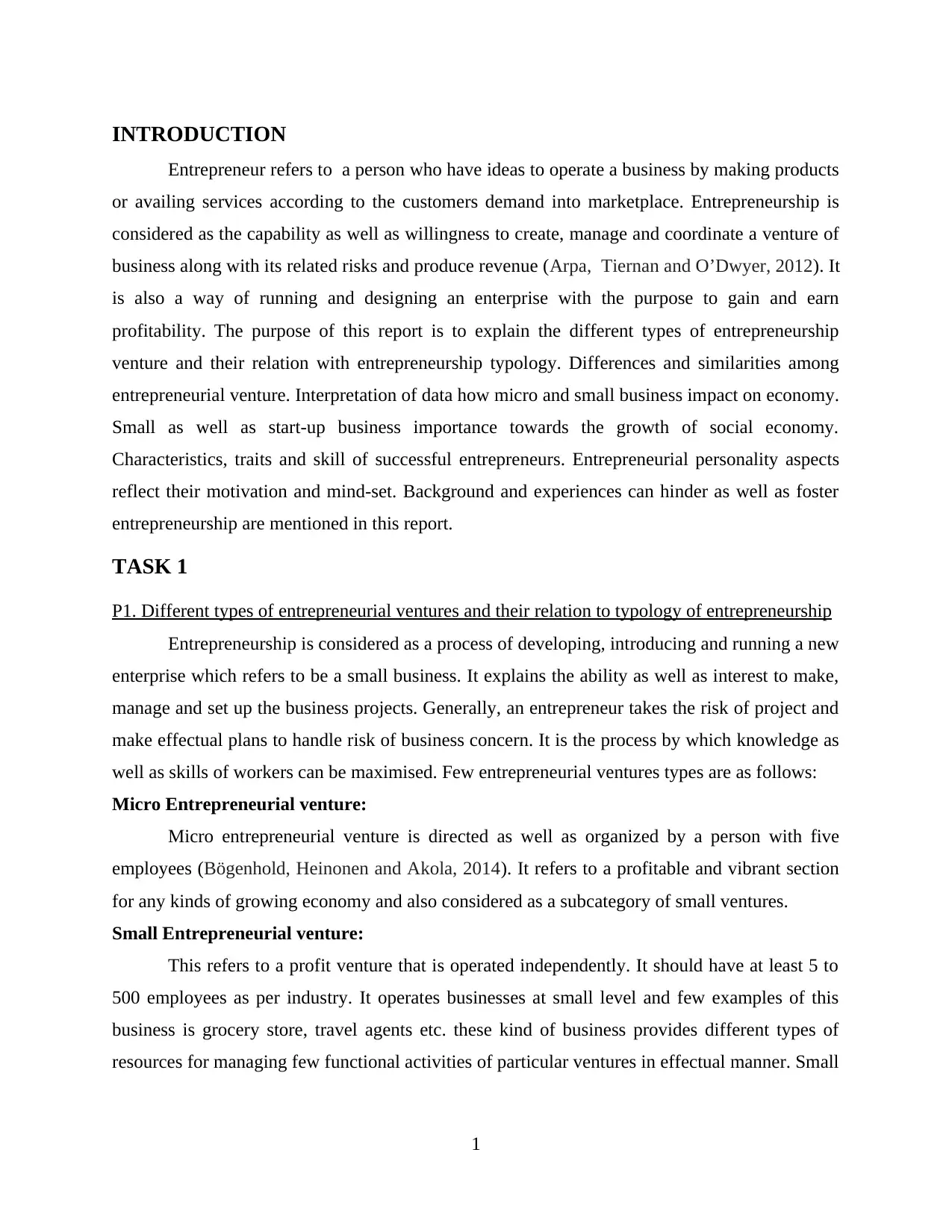
INTRODUCTION
Entrepreneur refers to a person who have ideas to operate a business by making products
or availing services according to the customers demand into marketplace. Entrepreneurship is
considered as the capability as well as willingness to create, manage and coordinate a venture of
business along with its related risks and produce revenue (Arpa, Tiernan and O’Dwyer, 2012). It
is also a way of running and designing an enterprise with the purpose to gain and earn
profitability. The purpose of this report is to explain the different types of entrepreneurship
venture and their relation with entrepreneurship typology. Differences and similarities among
entrepreneurial venture. Interpretation of data how micro and small business impact on economy.
Small as well as start-up business importance towards the growth of social economy.
Characteristics, traits and skill of successful entrepreneurs. Entrepreneurial personality aspects
reflect their motivation and mind-set. Background and experiences can hinder as well as foster
entrepreneurship are mentioned in this report.
TASK 1
P1. Different types of entrepreneurial ventures and their relation to typology of entrepreneurship
Entrepreneurship is considered as a process of developing, introducing and running a new
enterprise which refers to be a small business. It explains the ability as well as interest to make,
manage and set up the business projects. Generally, an entrepreneur takes the risk of project and
make effectual plans to handle risk of business concern. It is the process by which knowledge as
well as skills of workers can be maximised. Few entrepreneurial ventures types are as follows:
Micro Entrepreneurial venture:
Micro entrepreneurial venture is directed as well as organized by a person with five
employees (Bögenhold, Heinonen and Akola, 2014). It refers to a profitable and vibrant section
for any kinds of growing economy and also considered as a subcategory of small ventures.
Small Entrepreneurial venture:
This refers to a profit venture that is operated independently. It should have at least 5 to
500 employees as per industry. It operates businesses at small level and few examples of this
business is grocery store, travel agents etc. these kind of business provides different types of
resources for managing few functional activities of particular ventures in effectual manner. Small
1
Entrepreneur refers to a person who have ideas to operate a business by making products
or availing services according to the customers demand into marketplace. Entrepreneurship is
considered as the capability as well as willingness to create, manage and coordinate a venture of
business along with its related risks and produce revenue (Arpa, Tiernan and O’Dwyer, 2012). It
is also a way of running and designing an enterprise with the purpose to gain and earn
profitability. The purpose of this report is to explain the different types of entrepreneurship
venture and their relation with entrepreneurship typology. Differences and similarities among
entrepreneurial venture. Interpretation of data how micro and small business impact on economy.
Small as well as start-up business importance towards the growth of social economy.
Characteristics, traits and skill of successful entrepreneurs. Entrepreneurial personality aspects
reflect their motivation and mind-set. Background and experiences can hinder as well as foster
entrepreneurship are mentioned in this report.
TASK 1
P1. Different types of entrepreneurial ventures and their relation to typology of entrepreneurship
Entrepreneurship is considered as a process of developing, introducing and running a new
enterprise which refers to be a small business. It explains the ability as well as interest to make,
manage and set up the business projects. Generally, an entrepreneur takes the risk of project and
make effectual plans to handle risk of business concern. It is the process by which knowledge as
well as skills of workers can be maximised. Few entrepreneurial ventures types are as follows:
Micro Entrepreneurial venture:
Micro entrepreneurial venture is directed as well as organized by a person with five
employees (Bögenhold, Heinonen and Akola, 2014). It refers to a profitable and vibrant section
for any kinds of growing economy and also considered as a subcategory of small ventures.
Small Entrepreneurial venture:
This refers to a profit venture that is operated independently. It should have at least 5 to
500 employees as per industry. It operates businesses at small level and few examples of this
business is grocery store, travel agents etc. these kind of business provides different types of
resources for managing few functional activities of particular ventures in effectual manner. Small
1
⊘ This is a preview!⊘
Do you want full access?
Subscribe today to unlock all pages.

Trusted by 1+ million students worldwide
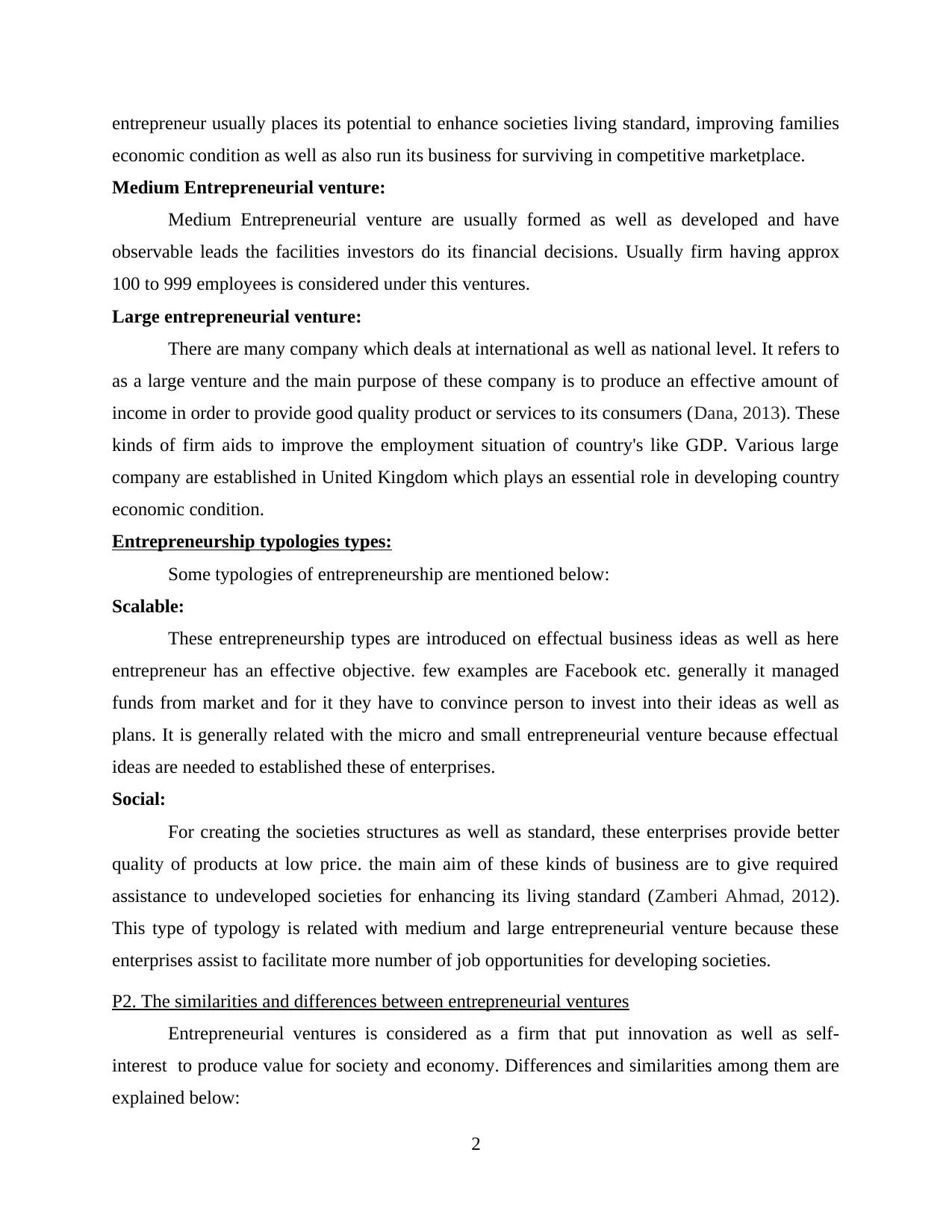
entrepreneur usually places its potential to enhance societies living standard, improving families
economic condition as well as also run its business for surviving in competitive marketplace.
Medium Entrepreneurial venture:
Medium Entrepreneurial venture are usually formed as well as developed and have
observable leads the facilities investors do its financial decisions. Usually firm having approx
100 to 999 employees is considered under this ventures.
Large entrepreneurial venture:
There are many company which deals at international as well as national level. It refers to
as a large venture and the main purpose of these company is to produce an effective amount of
income in order to provide good quality product or services to its consumers (Dana, 2013). These
kinds of firm aids to improve the employment situation of country's like GDP. Various large
company are established in United Kingdom which plays an essential role in developing country
economic condition.
Entrepreneurship typologies types:
Some typologies of entrepreneurship are mentioned below:
Scalable:
These entrepreneurship types are introduced on effectual business ideas as well as here
entrepreneur has an effective objective. few examples are Facebook etc. generally it managed
funds from market and for it they have to convince person to invest into their ideas as well as
plans. It is generally related with the micro and small entrepreneurial venture because effectual
ideas are needed to established these of enterprises.
Social:
For creating the societies structures as well as standard, these enterprises provide better
quality of products at low price. the main aim of these kinds of business are to give required
assistance to undeveloped societies for enhancing its living standard (Zamberi Ahmad, 2012).
This type of typology is related with medium and large entrepreneurial venture because these
enterprises assist to facilitate more number of job opportunities for developing societies.
P2. The similarities and differences between entrepreneurial ventures
Entrepreneurial ventures is considered as a firm that put innovation as well as self-
interest to produce value for society and economy. Differences and similarities among them are
explained below:
2
economic condition as well as also run its business for surviving in competitive marketplace.
Medium Entrepreneurial venture:
Medium Entrepreneurial venture are usually formed as well as developed and have
observable leads the facilities investors do its financial decisions. Usually firm having approx
100 to 999 employees is considered under this ventures.
Large entrepreneurial venture:
There are many company which deals at international as well as national level. It refers to
as a large venture and the main purpose of these company is to produce an effective amount of
income in order to provide good quality product or services to its consumers (Dana, 2013). These
kinds of firm aids to improve the employment situation of country's like GDP. Various large
company are established in United Kingdom which plays an essential role in developing country
economic condition.
Entrepreneurship typologies types:
Some typologies of entrepreneurship are mentioned below:
Scalable:
These entrepreneurship types are introduced on effectual business ideas as well as here
entrepreneur has an effective objective. few examples are Facebook etc. generally it managed
funds from market and for it they have to convince person to invest into their ideas as well as
plans. It is generally related with the micro and small entrepreneurial venture because effectual
ideas are needed to established these of enterprises.
Social:
For creating the societies structures as well as standard, these enterprises provide better
quality of products at low price. the main aim of these kinds of business are to give required
assistance to undeveloped societies for enhancing its living standard (Zamberi Ahmad, 2012).
This type of typology is related with medium and large entrepreneurial venture because these
enterprises assist to facilitate more number of job opportunities for developing societies.
P2. The similarities and differences between entrepreneurial ventures
Entrepreneurial ventures is considered as a firm that put innovation as well as self-
interest to produce value for society and economy. Differences and similarities among them are
explained below:
2
Paraphrase This Document
Need a fresh take? Get an instant paraphrase of this document with our AI Paraphraser
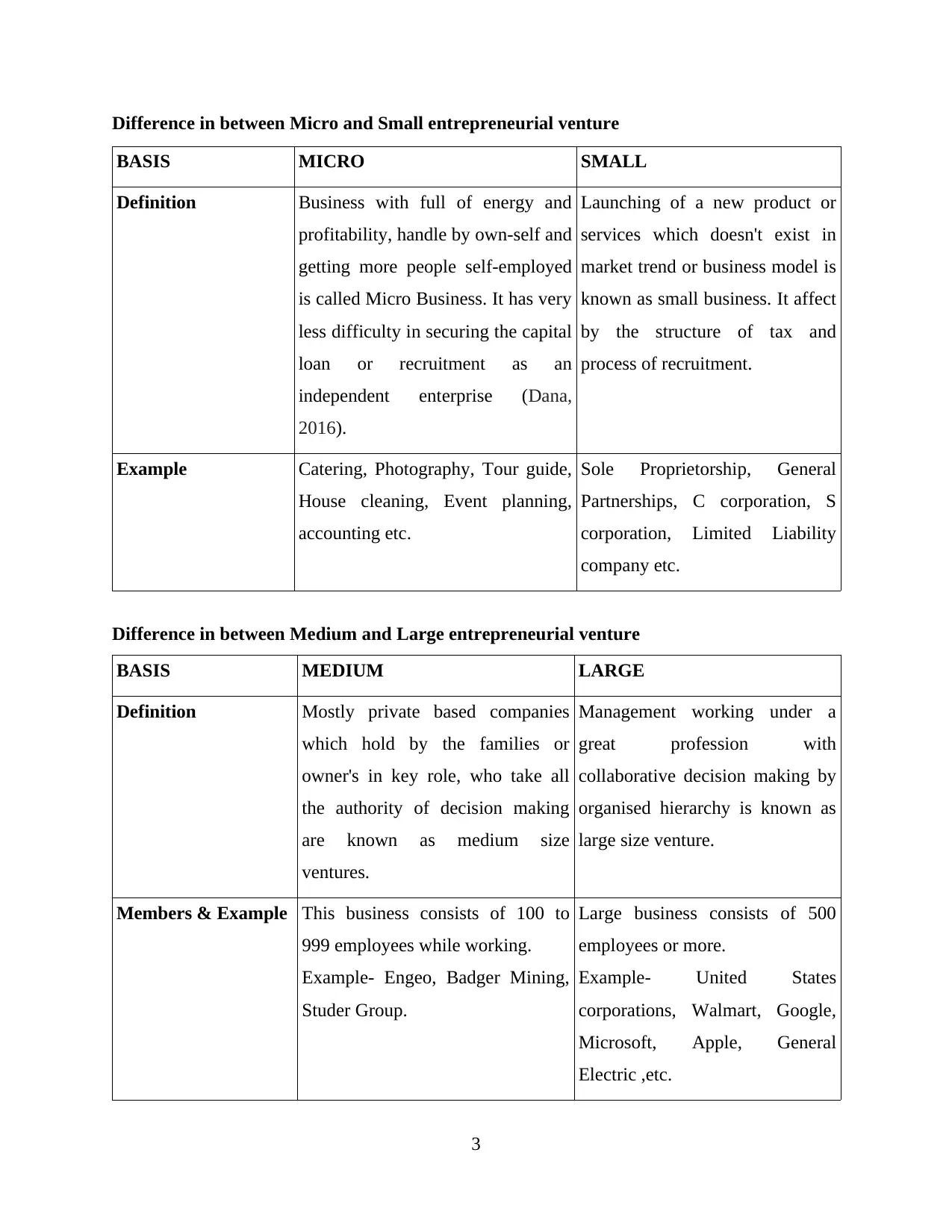
Difference in between Micro and Small entrepreneurial venture
BASIS MICRO SMALL
Definition Business with full of energy and
profitability, handle by own-self and
getting more people self-employed
is called Micro Business. It has very
less difficulty in securing the capital
loan or recruitment as an
independent enterprise (Dana,
2016).
Launching of a new product or
services which doesn't exist in
market trend or business model is
known as small business. It affect
by the structure of tax and
process of recruitment.
Example Catering, Photography, Tour guide,
House cleaning, Event planning,
accounting etc.
Sole Proprietorship, General
Partnerships, C corporation, S
corporation, Limited Liability
company etc.
Difference in between Medium and Large entrepreneurial venture
BASIS MEDIUM LARGE
Definition Mostly private based companies
which hold by the families or
owner's in key role, who take all
the authority of decision making
are known as medium size
ventures.
Management working under a
great profession with
collaborative decision making by
organised hierarchy is known as
large size venture.
Members & Example This business consists of 100 to
999 employees while working.
Example- Engeo, Badger Mining,
Studer Group.
Large business consists of 500
employees or more.
Example- United States
corporations, Walmart, Google,
Microsoft, Apple, General
Electric ,etc.
3
BASIS MICRO SMALL
Definition Business with full of energy and
profitability, handle by own-self and
getting more people self-employed
is called Micro Business. It has very
less difficulty in securing the capital
loan or recruitment as an
independent enterprise (Dana,
2016).
Launching of a new product or
services which doesn't exist in
market trend or business model is
known as small business. It affect
by the structure of tax and
process of recruitment.
Example Catering, Photography, Tour guide,
House cleaning, Event planning,
accounting etc.
Sole Proprietorship, General
Partnerships, C corporation, S
corporation, Limited Liability
company etc.
Difference in between Medium and Large entrepreneurial venture
BASIS MEDIUM LARGE
Definition Mostly private based companies
which hold by the families or
owner's in key role, who take all
the authority of decision making
are known as medium size
ventures.
Management working under a
great profession with
collaborative decision making by
organised hierarchy is known as
large size venture.
Members & Example This business consists of 100 to
999 employees while working.
Example- Engeo, Badger Mining,
Studer Group.
Large business consists of 500
employees or more.
Example- United States
corporations, Walmart, Google,
Microsoft, Apple, General
Electric ,etc.
3
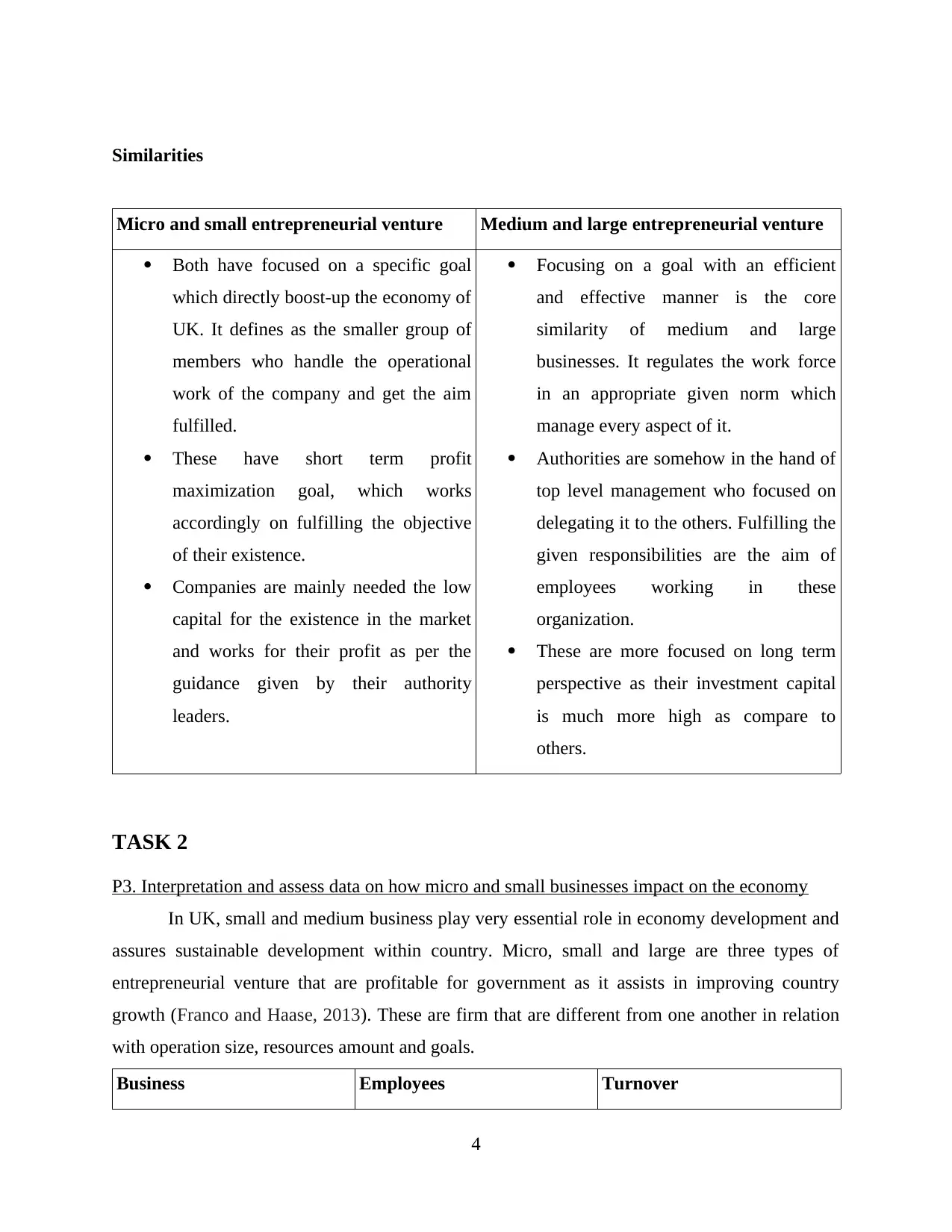
Similarities
Micro and small entrepreneurial venture Medium and large entrepreneurial venture
Both have focused on a specific goal
which directly boost-up the economy of
UK. It defines as the smaller group of
members who handle the operational
work of the company and get the aim
fulfilled.
These have short term profit
maximization goal, which works
accordingly on fulfilling the objective
of their existence.
Companies are mainly needed the low
capital for the existence in the market
and works for their profit as per the
guidance given by their authority
leaders.
Focusing on a goal with an efficient
and effective manner is the core
similarity of medium and large
businesses. It regulates the work force
in an appropriate given norm which
manage every aspect of it.
Authorities are somehow in the hand of
top level management who focused on
delegating it to the others. Fulfilling the
given responsibilities are the aim of
employees working in these
organization.
These are more focused on long term
perspective as their investment capital
is much more high as compare to
others.
TASK 2
P3. Interpretation and assess data on how micro and small businesses impact on the economy
In UK, small and medium business play very essential role in economy development and
assures sustainable development within country. Micro, small and large are three types of
entrepreneurial venture that are profitable for government as it assists in improving country
growth (Franco and Haase, 2013). These are firm that are different from one another in relation
with operation size, resources amount and goals.
Business Employees Turnover
4
Micro and small entrepreneurial venture Medium and large entrepreneurial venture
Both have focused on a specific goal
which directly boost-up the economy of
UK. It defines as the smaller group of
members who handle the operational
work of the company and get the aim
fulfilled.
These have short term profit
maximization goal, which works
accordingly on fulfilling the objective
of their existence.
Companies are mainly needed the low
capital for the existence in the market
and works for their profit as per the
guidance given by their authority
leaders.
Focusing on a goal with an efficient
and effective manner is the core
similarity of medium and large
businesses. It regulates the work force
in an appropriate given norm which
manage every aspect of it.
Authorities are somehow in the hand of
top level management who focused on
delegating it to the others. Fulfilling the
given responsibilities are the aim of
employees working in these
organization.
These are more focused on long term
perspective as their investment capital
is much more high as compare to
others.
TASK 2
P3. Interpretation and assess data on how micro and small businesses impact on the economy
In UK, small and medium business play very essential role in economy development and
assures sustainable development within country. Micro, small and large are three types of
entrepreneurial venture that are profitable for government as it assists in improving country
growth (Franco and Haase, 2013). These are firm that are different from one another in relation
with operation size, resources amount and goals.
Business Employees Turnover
4
⊘ This is a preview!⊘
Do you want full access?
Subscribe today to unlock all pages.

Trusted by 1+ million students worldwide
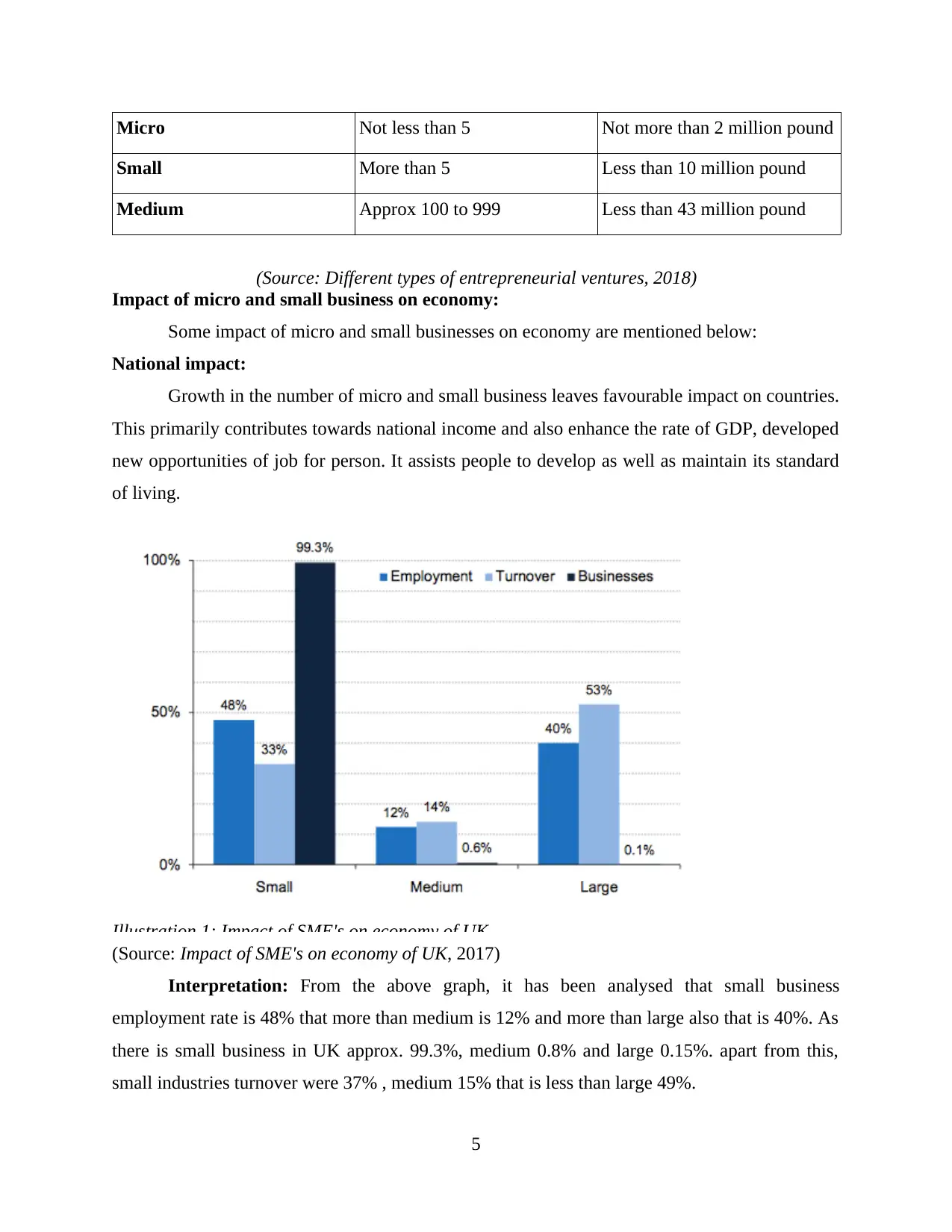
Micro Not less than 5 Not more than 2 million pound
Small More than 5 Less than 10 million pound
Medium Approx 100 to 999 Less than 43 million pound
(Source: Different types of entrepreneurial ventures, 2018)
Impact of micro and small business on economy:
Some impact of micro and small businesses on economy are mentioned below:
National impact:
Growth in the number of micro and small business leaves favourable impact on countries.
This primarily contributes towards national income and also enhance the rate of GDP, developed
new opportunities of job for person. It assists people to develop as well as maintain its standard
of living.
Illustration 1: Impact of SME's on economy of UK
(Source: Impact of SME's on economy of UK, 2017)
Interpretation: From the above graph, it has been analysed that small business
employment rate is 48% that more than medium is 12% and more than large also that is 40%. As
there is small business in UK approx. 99.3%, medium 0.8% and large 0.15%. apart from this,
small industries turnover were 37% , medium 15% that is less than large 49%.
5
Small More than 5 Less than 10 million pound
Medium Approx 100 to 999 Less than 43 million pound
(Source: Different types of entrepreneurial ventures, 2018)
Impact of micro and small business on economy:
Some impact of micro and small businesses on economy are mentioned below:
National impact:
Growth in the number of micro and small business leaves favourable impact on countries.
This primarily contributes towards national income and also enhance the rate of GDP, developed
new opportunities of job for person. It assists people to develop as well as maintain its standard
of living.
Illustration 1: Impact of SME's on economy of UK
(Source: Impact of SME's on economy of UK, 2017)
Interpretation: From the above graph, it has been analysed that small business
employment rate is 48% that more than medium is 12% and more than large also that is 40%. As
there is small business in UK approx. 99.3%, medium 0.8% and large 0.15%. apart from this,
small industries turnover were 37% , medium 15% that is less than large 49%.
5
Paraphrase This Document
Need a fresh take? Get an instant paraphrase of this document with our AI Paraphraser
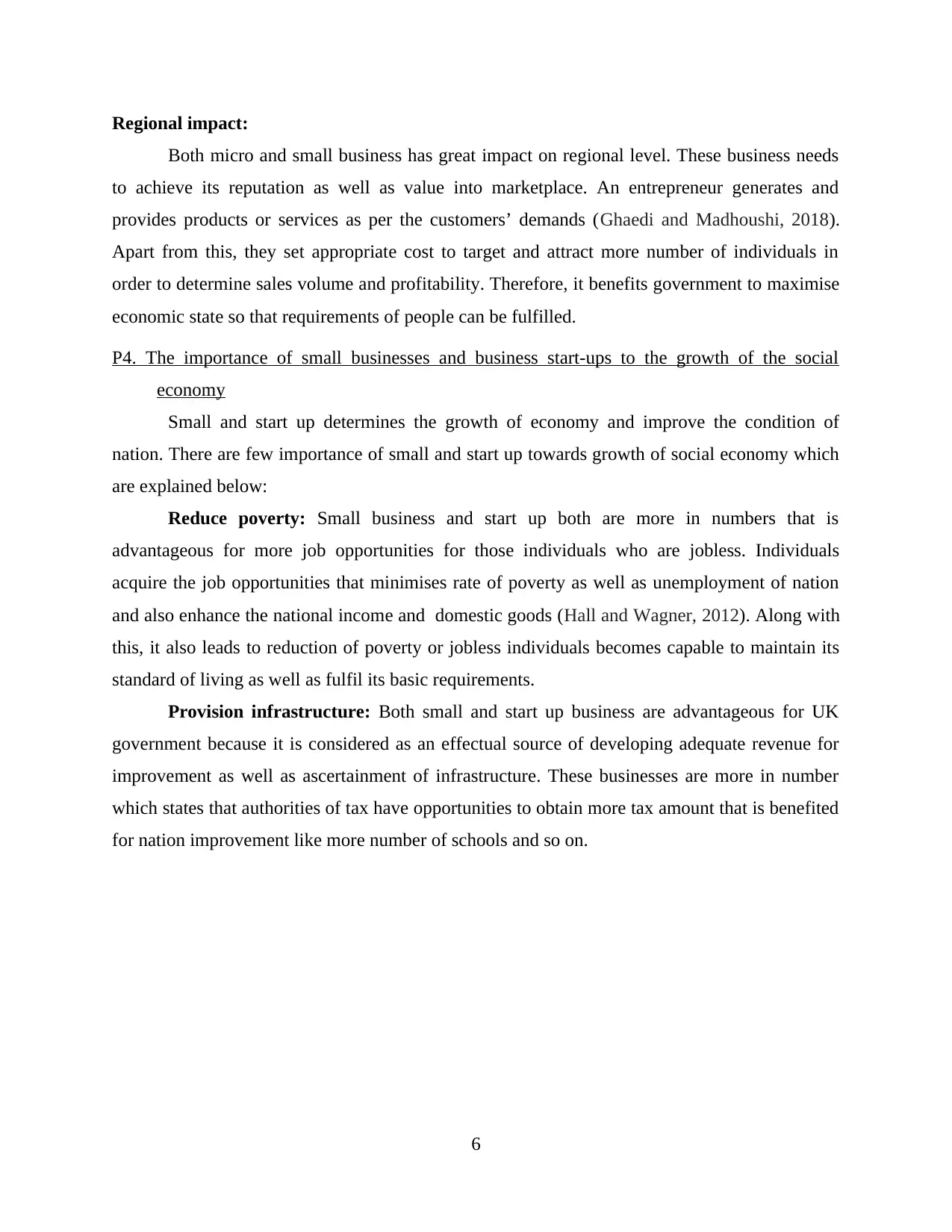
Regional impact:
Both micro and small business has great impact on regional level. These business needs
to achieve its reputation as well as value into marketplace. An entrepreneur generates and
provides products or services as per the customers’ demands (Ghaedi and Madhoushi, 2018).
Apart from this, they set appropriate cost to target and attract more number of individuals in
order to determine sales volume and profitability. Therefore, it benefits government to maximise
economic state so that requirements of people can be fulfilled.
P4. The importance of small businesses and business start-ups to the growth of the social
economy
Small and start up determines the growth of economy and improve the condition of
nation. There are few importance of small and start up towards growth of social economy which
are explained below:
Reduce poverty: Small business and start up both are more in numbers that is
advantageous for more job opportunities for those individuals who are jobless. Individuals
acquire the job opportunities that minimises rate of poverty as well as unemployment of nation
and also enhance the national income and domestic goods (Hall and Wagner, 2012). Along with
this, it also leads to reduction of poverty or jobless individuals becomes capable to maintain its
standard of living as well as fulfil its basic requirements.
Provision infrastructure: Both small and start up business are advantageous for UK
government because it is considered as an effectual source of developing adequate revenue for
improvement as well as ascertainment of infrastructure. These businesses are more in number
which states that authorities of tax have opportunities to obtain more tax amount that is benefited
for nation improvement like more number of schools and so on.
6
Both micro and small business has great impact on regional level. These business needs
to achieve its reputation as well as value into marketplace. An entrepreneur generates and
provides products or services as per the customers’ demands (Ghaedi and Madhoushi, 2018).
Apart from this, they set appropriate cost to target and attract more number of individuals in
order to determine sales volume and profitability. Therefore, it benefits government to maximise
economic state so that requirements of people can be fulfilled.
P4. The importance of small businesses and business start-ups to the growth of the social
economy
Small and start up determines the growth of economy and improve the condition of
nation. There are few importance of small and start up towards growth of social economy which
are explained below:
Reduce poverty: Small business and start up both are more in numbers that is
advantageous for more job opportunities for those individuals who are jobless. Individuals
acquire the job opportunities that minimises rate of poverty as well as unemployment of nation
and also enhance the national income and domestic goods (Hall and Wagner, 2012). Along with
this, it also leads to reduction of poverty or jobless individuals becomes capable to maintain its
standard of living as well as fulfil its basic requirements.
Provision infrastructure: Both small and start up business are advantageous for UK
government because it is considered as an effectual source of developing adequate revenue for
improvement as well as ascertainment of infrastructure. These businesses are more in number
which states that authorities of tax have opportunities to obtain more tax amount that is benefited
for nation improvement like more number of schools and so on.
6

TASK 3 & 4
7
7
⊘ This is a preview!⊘
Do you want full access?
Subscribe today to unlock all pages.

Trusted by 1+ million students worldwide
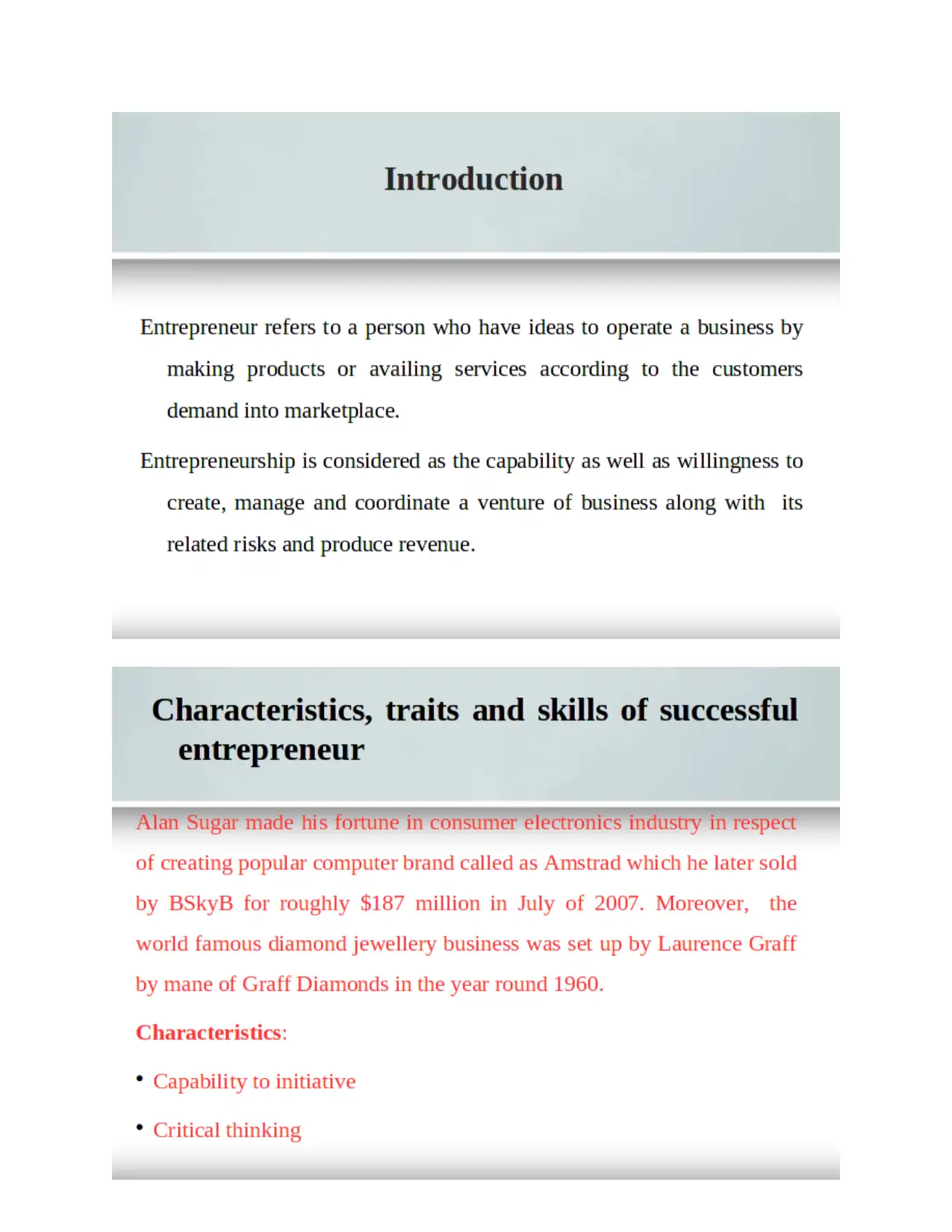
8
Paraphrase This Document
Need a fresh take? Get an instant paraphrase of this document with our AI Paraphraser

9

10
⊘ This is a preview!⊘
Do you want full access?
Subscribe today to unlock all pages.

Trusted by 1+ million students worldwide
1 out of 23
Related Documents
Your All-in-One AI-Powered Toolkit for Academic Success.
+13062052269
info@desklib.com
Available 24*7 on WhatsApp / Email
![[object Object]](/_next/static/media/star-bottom.7253800d.svg)
Unlock your academic potential
Copyright © 2020–2026 A2Z Services. All Rights Reserved. Developed and managed by ZUCOL.





